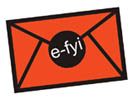Go to our E-FYI Newsletter | Go to Jonathan Slaff & Associates
TEXTÍ
FAN TUTTE
When we had the audience vote for who-marries-whom in "Così
fan Tutte" using text messaging,
we were prepared for same-sex marriages, but not for a tie.
by Jonathan Slaff
 |
Gina Crusco had a novel concept for a production to be named "Così fan Tutte: Defining Women," based on the classical score by W.A. Mozart and its libretto by Lorenzo da Ponte. Gina is my publicity client and Artistic Director of Underworld Productions Opera Ensemble, Inc., a "young" (founded in 2004) company based in upper Manhattan. Her production was booked for two nights, April 29 and 30, 2009 at Leonard Nimoy Thalia at Peter Norton Symphony Space, 2537 Broadway at 95th Street. The classical opera's plot involves three men, three women, a little fiancé-swapping, a wedding and the unanswered question of who is marrying whom. Gina wanted to ask the audience to pair up the characters for the final wedding scene--this was a novel idea, playful and commendably gutsy. I thought to myself, "The traditionalists may not like it, but they'll have to learn to take a joke."
I had learned to expect unusual ideas from Gina. She is a rising impressario; a small brunette with big ideas; a singer by training whose mind is surprisingly original and conceptual.
Gina also wanted to get high-tech. She had attended an outdoor New York Philharmonic concert where the audience voted by cell phones to choose the encores. Her plan was to try and use the same technology for plot development. As luck would have it, she had nobody in her organization who was technical enough to pull this off. So when we had our first publicity meeting, sometime in February, it was only about nine weeks before the opening and Gina had still not found a viable way to implement the idea.
 |
I thought it was an idea worth pursuing. It fit the opera like a glove. The story involves two sisters whose fiancés, abetted by their friend Alfonso, deceive them into swapping partners. Although "Così fan tutte" means "All women behave thus," the stage direction makes it clear that multiple courses of action are theoretically open to the women. They don't actually have to marry their original lovers, to whom they are wed in traditional performances. With six principal characters, the opera could conceivably conclude in a whole range of marriage combinations.
Gina had selected four marriage combinations based on the dramatic potential inherent in the original libretto. She liberally sprinkled tantalizing hints of burgeoning relationship throughout the staging, and rehearsed all of the variants with the cast. The possibility of same-sex marriages necessitated the opera to be transplanted from 18th century Italy to modern-day Cape Cod, Massachusetts. At the time of Gina's brainstorm, Massachusetts was the only place in the U.S. where such unions were legal. By the time we opened, a few other states had joined the fold.
Now she only needed a method of intermission balloting to button up the concept. Knowing of my experience with technology for arts marketing, Gina regarded me as a technical resource and asked me if I knew how to make cell phone voting work. I didn't immediately have a technical solution, but at least I had an expert to turn to. I called on my business partner in The Linux Loft, Ira Hyman, a resourceful all-around technician who happens to be a Linux maven. I took a chance that that Ira could rise to this tech challenge, or could at least locate a solution for us quickly. He offered to help in our research and assured me that some "easy enough" method would be found. So I stuck my neck out and assured Gina that electronic voting should remain in the show's concept.
Unfortunately, Ira's first impulse led us down a blind alley. He thought that Twitter might have a feature that could work for us. There is a cell phone feature in Twitter, but it wasn't right for our task. Strike One.
However, there was no Strike Two. Ira's next discovery was a web-based polling resource that was originally designed for business meetings. I called Gina gleefully, rejoicing that Ira had come through and that there was a browser-based polling system that could work for her show. All we would need was a laptop backstage to display the results of the voting. That would not be an impediment, she felt, since Symphony Space has wi-fi throughout the building.
So thanks to Ira's resourcefulness, Gina's original concept fell into place. To make sure that my solution would work, I volunteered to oversee the vote tabulation backstage on my own laptop.
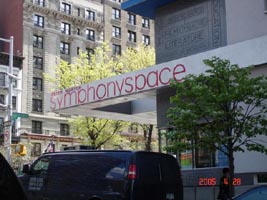 |
Outside
of Symphony Space, 2005 |
Symphony Space assured Gina that we could actually get an Internet connection backstage and that it was reliable. We verified that there was cell phone reception in the Leonard Nimoy Thalia. (If signals were weak, audience members would have had to vote in the lobby. That might have been messy.) The only remaining challenge, I thought, was to get the audience to comply. No one had ever done this kind of thing before. Cell phone voting in an opera was unprecedented. Usually, you are told at the opera to turn your cell phone off. A large and diverse audience, including many seniors, would have to comprehend a balloting system that would certainly be new to them. So Gina wrote a curtain speech, delivered by the singer playing Don Alfonso, and a pre-show announcement for herself to explain the process. She also created a one-page program insert that gave the following instructions to the audience, making the operation simple by assigning each of the four outcomes a short numerical code that would be text-messaged by each voter:
Cosi variant endings Forgive and forget -- TEXT 39696 to 99503 Fiordiligi marries Guglielmo Dorabella marries Ferrando Despina and Don Alfonso "just friends"
Fake it til you make it -- TEXT 39703 to 99503 Fiordiligi marries Ferrando Dorabella marries Guglielmo Despina and Don Alfonso "just friends"
Always expect the unexpected -- TEXT 39704 to 99503 Dorabella marries Don Alfonso Despina marries Ferrando Fiordiligi and Guglielmo "just friends"
Married in Massachusetts -- TEXT 39695 to 99503 Dorabella marries Despina Guglielmo marries Don Alfonso Fiordiligi and Ferrando "just friends" |
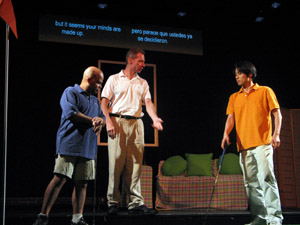 |
| Supertitles were projected in English and Spanish. This photo of the opening scene reveals the concept of setting the opera in Massachusets. The dare setting up the opera came out of a conversation over golf.L-R: Ivan Rivera (Ferrando), Nathan Resika (Don Alfonso), Soyoung Choi (Guglielmo). Photo by Nadia Kitirath. |
Intermission balloting wasn't to be the only technical challenge. The production also included a projected libretto. Gina had developed a cleverly contemporary original translation, and that was to be displayed overhead with a simultaneous Spanish translation. This was in keeping with the company's mission: the troupe is committed to creating wider audiences for opera by breaking down cultural barriers and reaching under-served communities, including those with limited access to the arts. Of course, supertitles are common in opera nowadays, so as technical hurtles go, this was considered "everyday stuff." Gina's tech crew could handle it.
My interns tested the balloting system by sending in a few votes from their own cell phones and those of some friends. Ironically, I couldn't participate personally in this test because I had blocked text messaging on my own cell phone, to prevent my 14-year-old daughter from running my bill up. But we were pleased to find that Gina's directions were easy to follow for the testers and that their votes were accurately posted to the web page in real time. Bar graphs and numeric tables were available to clearly display the count. The system was pretty fast, so we figured we could actually tabulate the votes in a ten-minute intermission and even track the trend of the votes as they flowed in. That would allow us to give the cast a "heads up" on the trend of the voting, so they could prepare appropriately.
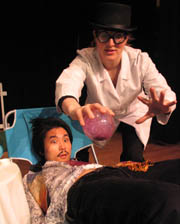 |
| Clowning at a pre-production photo shoot: Casey Hutchinson (Despina) revives Soyoung Choi (Guglielmo) with a healing crystal. Photo by Jonathan Slaff. |
We set the system defaults to allow only one vote per cell phone. This would keep the outcome to one-seat-one-vote.
I started to anticipate problems like an Internet outage or a laptop failure, but I decided not to distress myself with these imaginings. What the heck, you can only worry about so much. So I didn't bring a backup laptop to the show. When it came to the reliability of the wireless connection, I decided to just go on faith. I racked my brain: what were the other obvious holes to plug? It was easy to keep the cast from voting by making sure that the handouts with the codes were only distributed to the audience. So I felt pretty good about our ability to keep the voting honest. While I was dreaming up potential catastrophes, the publicity effort was catching on.
My press release headline had read, "Audience plays matchmaker in 'Così fan Tutte: Defining Women,' Underworld Productions Opera Ensemble, Inc.'s take on Mozart's perennial favorite. Audience members, using electronic voting, will pair up the characters for the final wedding scene." There was enough curiosity inspired by the story to result in a good amount of pre-show press. An item in the NY Post's Page Six bore the headline, "The end of opera." Our concept was called "a move purists will pray never comes to the Met." An item in the NY Times' Arts Briefly column read, "Even Mozart is being updated for the 'American Idol' age." We discovered a fair amount of Internet chatter and blog posts as well, so we were cautiously optimistic that the show would sell well. It had inspired a lot of witty comments, but my best epigram award goes to Paula Froelich at the Post, who quipped, "The opera ain't over until the audience texts." Ticket sales, slow at first, blossomed into sell-outs for both performances.
Would the audience choose their "traditional" partners?
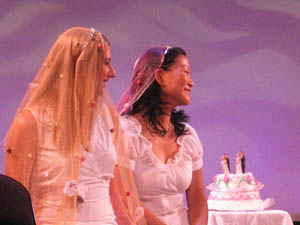 |
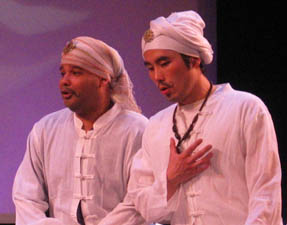 |
Elizabeth
Bouk (Dorabela),
Jeannie Im (Fiordiligi) |
Ivan
Rivera (Ferrando), Soyoung Choi (Guglielmo). Photos by Suzanne Trouve Feff. |
In the buildup to opening night, I congratulated myself on how well my experiments in new media had worked out in arts projects. Through the years, I had adapted new media to theater arts a lot. I had established NY Theatre Wire, a pioneering theater news site, in 1996 and nymuseums.com in 1997 to do the same thing for museums. I was the first person to use streaming media for theater ticketing (nyticketwire.com, 2001). I produced the first podcast for theater (Kings County Shakespeare Company, 2005) and produced the first foreign-language podcast for theater (Yangtze Repertory Theatre of America, 2005). Not content to limit my tech experiments to arts marketing, I had started The Linux Loft (www.linuxloft.com) with Ira Hyman in 2005 to develop and sell computer systems built for FOSS (Free and Open Source Software). Together we created the first fully open source computer system for kids: the Linux Loft Family Box. Our adventure found its way back to the arts anyway, when The Linux Loft partnered with a "distro" of Linux, Linspire, to sponsor the Passport to Puppet Theater marketing promotion in 2006 and 2007. This adventure wasn't technically complex, compared to many of these predecessors, so I allowed myself to feel confident, instead of nervous, for once.
 |
| Just about everybody voted, but as this picture shows, it was with a mix of paper ballots and cell phones. |
As Robert Burns wrote, "The best laid schemes o' Mice an' Men, Gang aft agley." The first complication was that the voting could not be completely automated after all. Gina discovered that many of her friends and contacts did not text, or did not even have cell phones, but they wanted to vote and would be disappointed to be excluded. So we decided to let people vote by circling their preferred outcome on the program insert. When the big night came, we handed out golf pencils to facilitate the process. A squad of performers and crew spirited the materials through the auditorium to the backstage area for processing. We created an efficient system for counting the ballots and adding their totals to what came off my screen. Still, we knew we were going to lose time as we counted the paper ballots. It might not be possible to forecast the result from the automated first returns, so the cast would have less time to prepare.
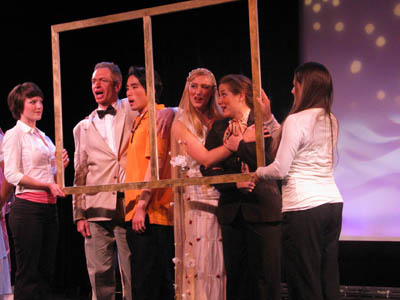 |
| On the first night, the same-sex ending edged ahead. Inside frame: Nathan Resika (Don Alfonso), Soyoung Choi (Guglielmo), Elizabeth Bouk (Dorabella), Casey Hutchinson (Despina). Photo by Nadia Kitirath. |
As to how the audience would actually react, we really didn't know what to expect. We hoped that everybody would be involved enough to vote. I think we were all secretly rooting for the "Married in Massachusetts" ending because it was naughtier and therefore more fun. On the first night, in the first five minutes of voting, we were surprised to see that the early returns favored the "traditional ending," which Gina had named "Forgive and forget," in which the couples return to their original configuration and Despina and Don Alfonso remain "just friends." By the end, though, when the paper ballots were counted, the same-sex combination edged ahead. It turns out the early returns were misleading. By the end of the voting, the cell phone voting was pretty close, percentage-wise, to the combined outcome.
I had the honor of Gina asking me to join the curtain call on opening night, with my laptop in hand, as the opera's webmaster. Afterwards, I sat with the laptop on the stage and displayed the outcome to interested audience members, with a paper copy of the tabulations from the paper ballots at hand so they could verify that the outcome was honest.
VOTING RESULTS, DAY 1
| BY TEXT |
PAPER |
TOTAL |
|
| Forgive and forget |
4 |
19 |
23 |
| Fake it til you make it |
9 |
14 |
23 |
| Always expect the unexpected |
6 |
4 |
10 |
| Married in Massachusetts |
17 |
15 |
32 |
| 36 |
52 |
88 |
The second night brought us to the second complication. It was review night, but we were not jittery. The performance had started peacefully enough. The show had been enthusiastically received the night before, encouraging the singers, and our counting system had proven itself, encouraging me.
Ira Hyman was in the audience with his wife, Yue. They were smiling broadly and sitting on the aisle, with Ira nursing a broken ankle and Yue about six months pregnant. They would have to leave at intermission, before the voting break in Act 2, and not even witness Ira's tech vision at work. They told me on their way out that they were enjoying the opera immensely, but they needed to be back in Kew Gardens by 10:45 PM because Ira had to meet his regularly scheduled Access-a-Ride for his commute to a graveyard shift where he works. Yue had to get enough sleep before rising early for work.
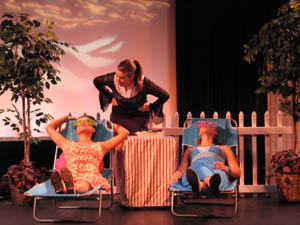 |
| Sunbathing in Massachusets: Jeannie Im (Fiordiligi), Casey Hutchinson (Despina), Elizabeth Bouk (Dorabela). Photo by Suzanne Trouve Feff. |
The cast, having performed the gay ending the night before, were all actually hoping that endings 1, 2 or 3 would be chosen by the second-night audience so they could have a different experience. We all thought we were prepared for everything. Then, to our shock and surprise, we discovered a three-way tie in the voting! After ten minutes of balloting, "Forgive and forget," "Fake it til you make it" and "Married in Massachusetts" each had 21 votes. We panicked. We had not anticipated the need for a tie-breaker. What to do?
In these situations, there are moments of panic and moments of clarity. Gina was prepared to make the tie-breaking vote herself in favor of pairing the women with their new-found lovers. I had a few thoughts of how I might justify this to the critic from Opera News. But I had a better idea.
I called Ira and Yue on their cell phone to see if they had voted. Fortunately they were reachable, but I had to talk fast while our cell connection was good, before they reached a "dead zone." They had not voted, and explained why. Ira, ironically for a software guru, doesn't use text messaging. Being technical chauvinists, they wouldn't resort to a paper ballot. They condescended to be the tiebreaker and both voted for the "gay" ending. That put "Married in Massachusetts" ahead by two votes. A moment later, a hanging vote posted to my computer screen. Somebody had texted for "Fake it till you make it," but the vote hadn't registered until that moment. Still, the plurality was clear, so the company went onstage to perform the "gay" ending for the second time in two nights.
FINAL VOTING RESULTS, DAY 2
| BY TEXT |
PAPER |
TOTAL |
|
| Forgive and forget |
4 |
17 |
21 |
| Fake it til you make it |
9 |
14 |
22 |
| Always expect the unexpected |
6 |
12 |
18 |
| Married in Massachusetts |
14 |
9 |
23 |
| 33 |
52 |
84 |
I'd heard of experimental theater and I guess this was experimental opera. The experiment was now over, but what did it teach us? Was this, as the Post foreshadowed, an "end to opera"?
 |
| Sign that was left up at the entrance to the theater indicates why our voting concept was so outrageous. |
While it may be anathema to the gatekeepers of opera culture to invite audiences to bring their cell phones to the opera, we found there was nary a stray ring tone throughout both performances. At the top of the show an announcement was made thanking the audience for bringing the devices, with a reminder to keep them silent until it was time to vote. It worked like a charm. Our impression is that cell phone voting did not invite trouble or distracting influences during the performance. On the contrary, it was regarded as an enjoyable addition to the experience by most patrons. The entire audience seemed intensely engaged in the cell phone balloting when the time came. Other than Ira and Yue, there were no abstentions that I knew of.
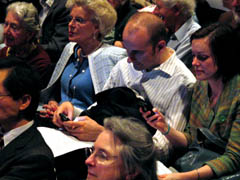 |
Cell
phone voters. Photo by Suzanne Trouve Feff. |
I regarded the concept as creatively successful. The drama of the voting suited this comic opera and certainly enhanced the evening. It gave the experience an "edgy" feeling that enhanced the evening far beyond the impact it would have had without it. I wouldn't even call it my "dominant memory" of the production though, because the show was ingenious and creatively innovative in so many ways. Mozart's glorious music was rendered wonderfully and Gina's sassy supertitles were witty and delicious. (Of course, I'm supposed to leave this kind of assessment to the critics, but I couldn't resist.)
The number of cell phone votes was only about 40% of the total votes, but that is surprising, since--as the pictures testify--just about everybody had a cell phone in hand at the voting breaks. It's reassuring to note that the cell phone vote results pointed out the overall winner on both nights.
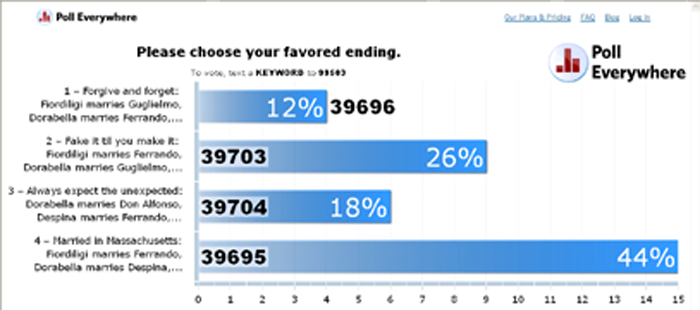 |
bar
graph of second night's cellphone voting results |
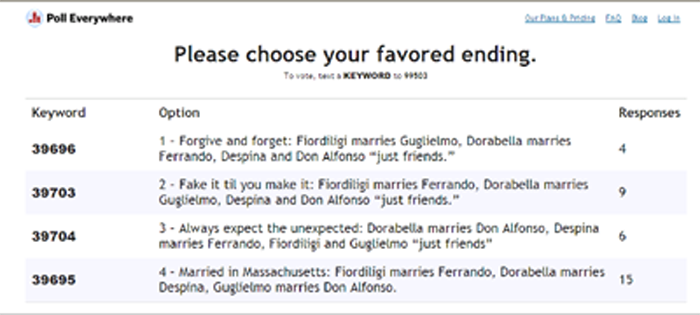 |
numerical
display of second night's cellphone voting |
The percentage of participation is interesting. Ticket sales were 129 on the first night and 125 on the second, so the traceable percentage of audience members voting was about 68%. That's not everybody in the house, but in terms of usual audience participation in a theater, that's huge. These numbers even understate the actual participation, however, for a variety of reasons:
- On both nights, a few paper ballots had to be disqualified because audience members voted for multiple outcomes.
- There may have been a failure rate in text messaging that we can't trace. Published sources report that carrier leakage, user error, and other forms of failure related to text messaging can be as high as 30%.
- There were probably other audience members, like Ira and Yue, who may have left before the balloting for various reasons, including illness. So the ticket count doesn't specifically reflect the number of people in the house when voting happened.
- There must have been cases where a two people came to the show with one cell phone. Our default setting was one vote per phone. In such cases, their second vote may not have been accepted, or the couple may have felt that the first vote was enough audience participation for them and didn't take the extra step of submitting a paper ballot.
So I'm guessing that the percentage of actual audience involvement in the voting was much higher than we can trace.
If anyone voted first by cell phone and then again by paper ballot, we will never know, but I don't think so. We didn't hear anyone bragging about beating the system.
Did anybody suspect that the results were fixed? I don't know. Nobody challenged me during my post-production displays of the results. Actually, only a few people came forward to speak with me. I think that my appearance as the voting facilitator was unusual and that most audience members would not even think to be curious or investigate it. I may have just looked like a guy carrying a controller from the light board.
 |
| Gina Crusco at curtain call on first night of "Così fan Tutte: Defining Women" |
Yes, this was a successful experiment. But I would caution producers in small houses, where a tie vote is more mathematically likely, to be prepared beforehand with a more official method of breaking a tie. There are no hanging chads in cell phone voting, but there can be other sudden surprises.
And I am relieved to say, nobody has vilified me in print yet as "The Press Agent Who Killed Opera."
Go
to our E-FYI Newsletter |
Go
to home page |
||
|
